Personal Teaching Philosophy: Early Childhood Education & Learning
VerifiedAdded on 2023/06/10
|9
|1944
|262
Essay
AI Summary
This essay presents a student's personal philosophy on teaching and learning, focusing on early childhood education. It includes a teaching mission statement emphasizing the development of cognitive, physical, language, and social skills through play-based learning. The essay reflects on the teacher's self-image as an influencer, acceptor, and understanding figure, highlighting the importance of early childhood education in fostering language, literacy, thinking skills, self-control, and self-confidence. The author discusses the image of the child as rich in potential and connected to others, emphasizing the importance of family and community involvement. Key theories, such as Erikson's psychosocial development theory and Montessori's approach, are explored for their influence on the author's teaching practices. The conclusion underscores the vital role of early year educators in shaping a child's overall development and preparing them for the future.
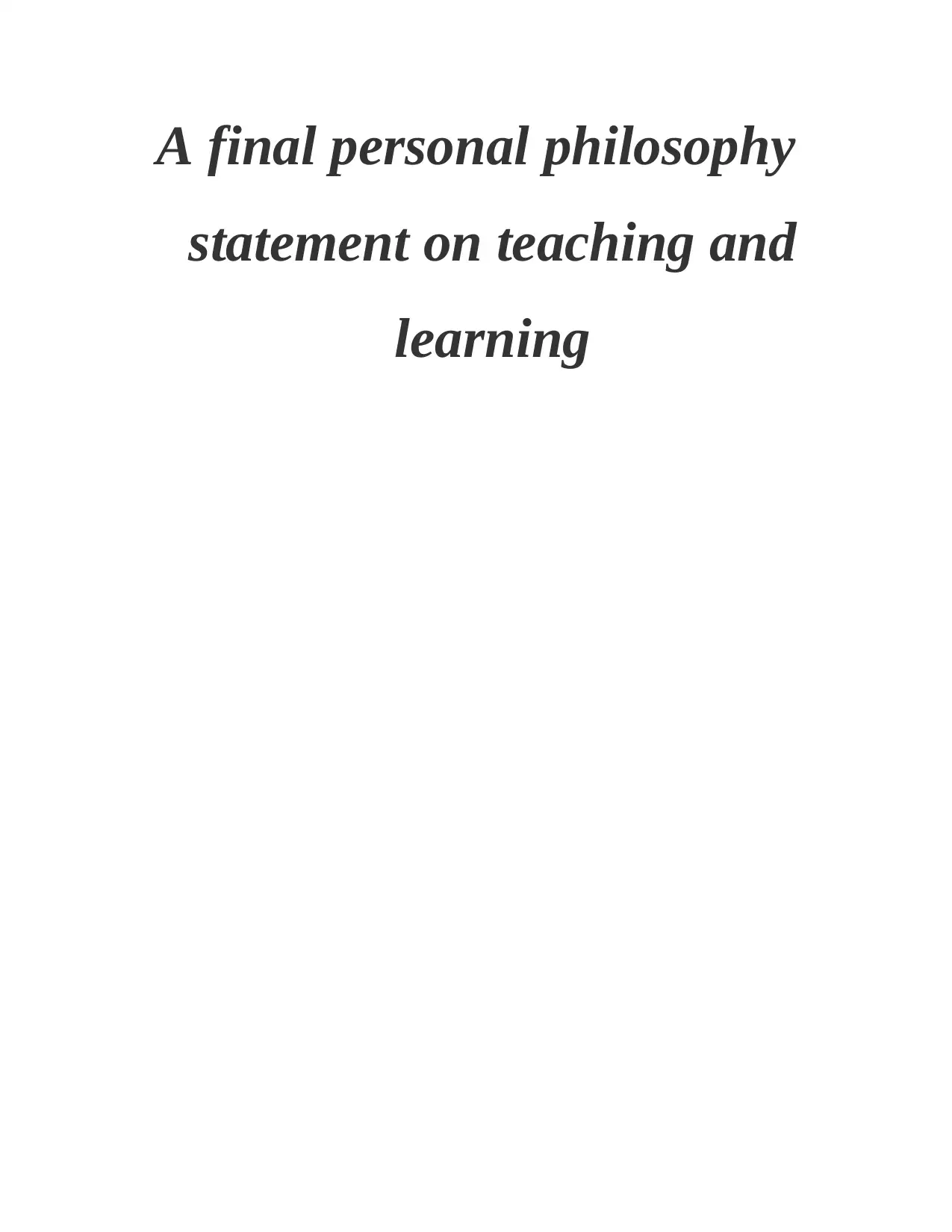
A final personal philosophy
statement on teaching and
learning
statement on teaching and
learning
Paraphrase This Document
Need a fresh take? Get an instant paraphrase of this document with our AI Paraphraser

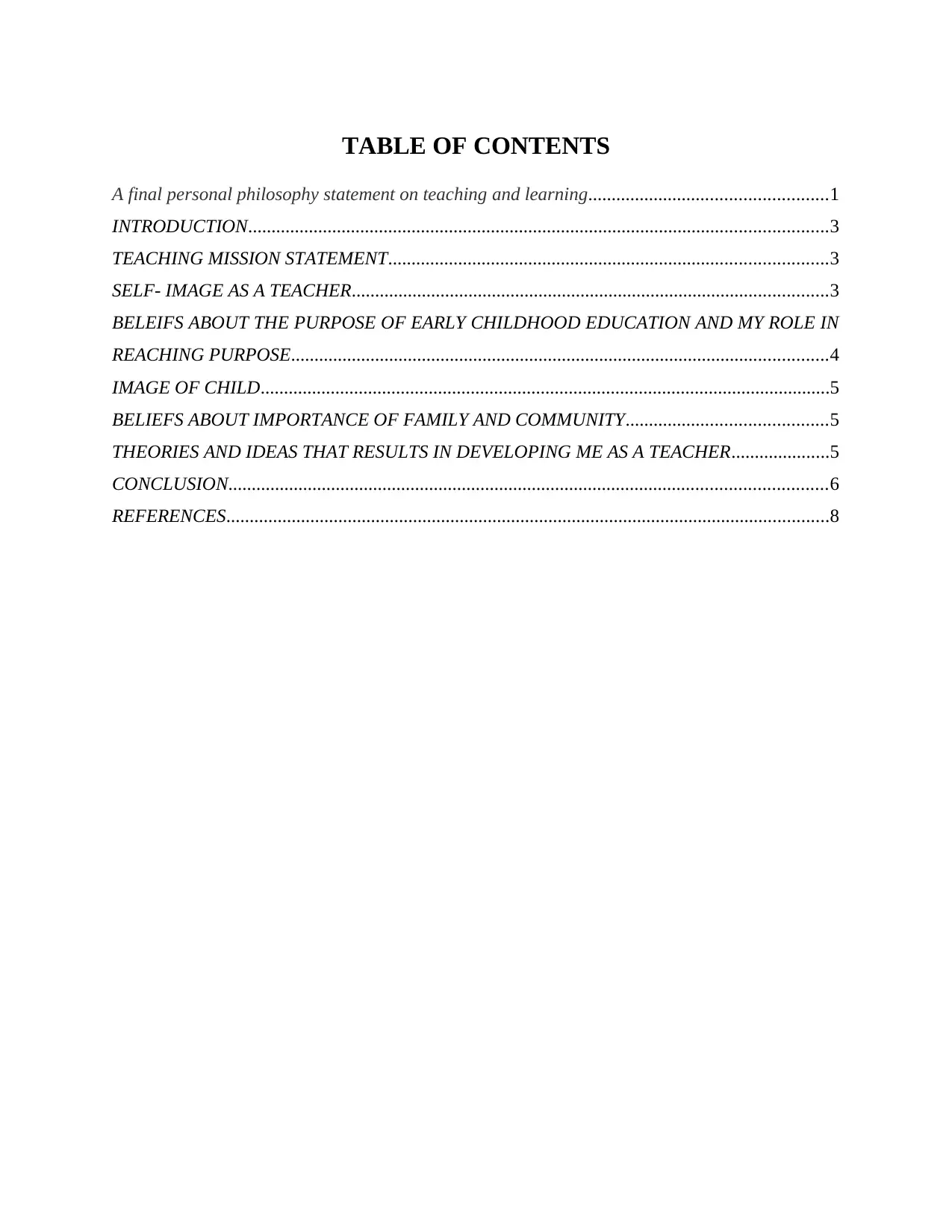
TABLE OF CONTENTS
A final personal philosophy statement on teaching and learning...................................................1
INTRODUCTION............................................................................................................................3
TEACHING MISSION STATEMENT..............................................................................................3
SELF- IMAGE AS A TEACHER......................................................................................................3
BELEIFS ABOUT THE PURPOSE OF EARLY CHILDHOOD EDUCATION AND MY ROLE IN
REACHING PURPOSE...................................................................................................................4
IMAGE OF CHILD..........................................................................................................................5
BELIEFS ABOUT IMPORTANCE OF FAMILY AND COMMUNITY...........................................5
THEORIES AND IDEAS THAT RESULTS IN DEVELOPING ME AS A TEACHER.....................5
CONCLUSION................................................................................................................................6
REFERENCES.................................................................................................................................8
A final personal philosophy statement on teaching and learning...................................................1
INTRODUCTION............................................................................................................................3
TEACHING MISSION STATEMENT..............................................................................................3
SELF- IMAGE AS A TEACHER......................................................................................................3
BELEIFS ABOUT THE PURPOSE OF EARLY CHILDHOOD EDUCATION AND MY ROLE IN
REACHING PURPOSE...................................................................................................................4
IMAGE OF CHILD..........................................................................................................................5
BELIEFS ABOUT IMPORTANCE OF FAMILY AND COMMUNITY...........................................5
THEORIES AND IDEAS THAT RESULTS IN DEVELOPING ME AS A TEACHER.....................5
CONCLUSION................................................................................................................................6
REFERENCES.................................................................................................................................8
⊘ This is a preview!⊘
Do you want full access?
Subscribe today to unlock all pages.

Trusted by 1+ million students worldwide
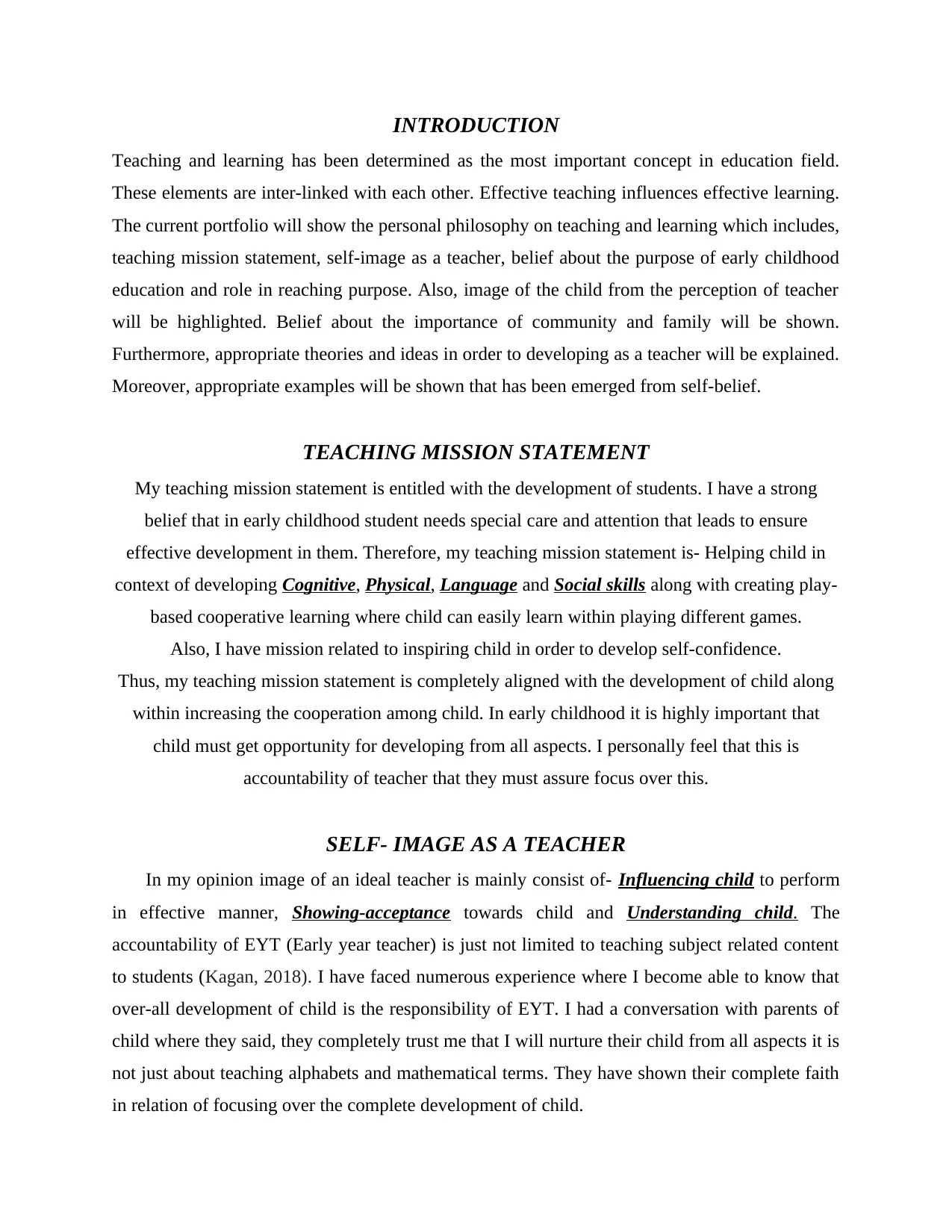
INTRODUCTION
Teaching and learning has been determined as the most important concept in education field.
These elements are inter-linked with each other. Effective teaching influences effective learning.
The current portfolio will show the personal philosophy on teaching and learning which includes,
teaching mission statement, self-image as a teacher, belief about the purpose of early childhood
education and role in reaching purpose. Also, image of the child from the perception of teacher
will be highlighted. Belief about the importance of community and family will be shown.
Furthermore, appropriate theories and ideas in order to developing as a teacher will be explained.
Moreover, appropriate examples will be shown that has been emerged from self-belief.
TEACHING MISSION STATEMENT
My teaching mission statement is entitled with the development of students. I have a strong
belief that in early childhood student needs special care and attention that leads to ensure
effective development in them. Therefore, my teaching mission statement is- Helping child in
context of developing Cognitive, Physical, Language and Social skills along with creating play-
based cooperative learning where child can easily learn within playing different games.
Also, I have mission related to inspiring child in order to develop self-confidence.
Thus, my teaching mission statement is completely aligned with the development of child along
within increasing the cooperation among child. In early childhood it is highly important that
child must get opportunity for developing from all aspects. I personally feel that this is
accountability of teacher that they must assure focus over this.
SELF- IMAGE AS A TEACHER
In my opinion image of an ideal teacher is mainly consist of- Influencing child to perform
in effective manner, Showing-acceptance towards child and Understanding child. The
accountability of EYT (Early year teacher) is just not limited to teaching subject related content
to students (Kagan, 2018). I have faced numerous experience where I become able to know that
over-all development of child is the responsibility of EYT. I had a conversation with parents of
child where they said, they completely trust me that I will nurture their child from all aspects it is
not just about teaching alphabets and mathematical terms. They have shown their complete faith
in relation of focusing over the complete development of child.
Teaching and learning has been determined as the most important concept in education field.
These elements are inter-linked with each other. Effective teaching influences effective learning.
The current portfolio will show the personal philosophy on teaching and learning which includes,
teaching mission statement, self-image as a teacher, belief about the purpose of early childhood
education and role in reaching purpose. Also, image of the child from the perception of teacher
will be highlighted. Belief about the importance of community and family will be shown.
Furthermore, appropriate theories and ideas in order to developing as a teacher will be explained.
Moreover, appropriate examples will be shown that has been emerged from self-belief.
TEACHING MISSION STATEMENT
My teaching mission statement is entitled with the development of students. I have a strong
belief that in early childhood student needs special care and attention that leads to ensure
effective development in them. Therefore, my teaching mission statement is- Helping child in
context of developing Cognitive, Physical, Language and Social skills along with creating play-
based cooperative learning where child can easily learn within playing different games.
Also, I have mission related to inspiring child in order to develop self-confidence.
Thus, my teaching mission statement is completely aligned with the development of child along
within increasing the cooperation among child. In early childhood it is highly important that
child must get opportunity for developing from all aspects. I personally feel that this is
accountability of teacher that they must assure focus over this.
SELF- IMAGE AS A TEACHER
In my opinion image of an ideal teacher is mainly consist of- Influencing child to perform
in effective manner, Showing-acceptance towards child and Understanding child. The
accountability of EYT (Early year teacher) is just not limited to teaching subject related content
to students (Kagan, 2018). I have faced numerous experience where I become able to know that
over-all development of child is the responsibility of EYT. I had a conversation with parents of
child where they said, they completely trust me that I will nurture their child from all aspects it is
not just about teaching alphabets and mathematical terms. They have shown their complete faith
in relation of focusing over the complete development of child.
Paraphrase This Document
Need a fresh take? Get an instant paraphrase of this document with our AI Paraphraser
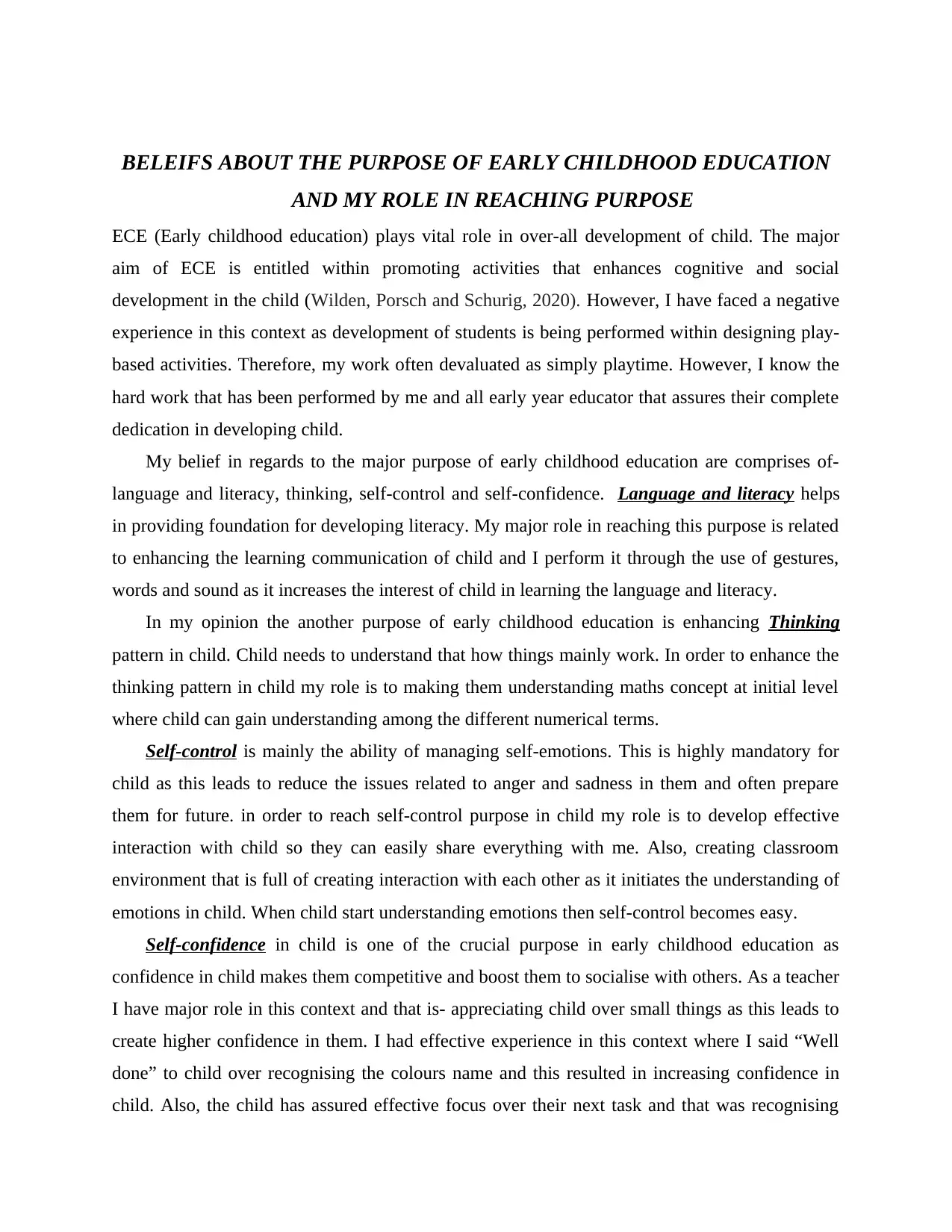
BELEIFS ABOUT THE PURPOSE OF EARLY CHILDHOOD EDUCATION
AND MY ROLE IN REACHING PURPOSE
ECE (Early childhood education) plays vital role in over-all development of child. The major
aim of ECE is entitled within promoting activities that enhances cognitive and social
development in the child (Wilden, Porsch and Schurig, 2020). However, I have faced a negative
experience in this context as development of students is being performed within designing play-
based activities. Therefore, my work often devaluated as simply playtime. However, I know the
hard work that has been performed by me and all early year educator that assures their complete
dedication in developing child.
My belief in regards to the major purpose of early childhood education are comprises of-
language and literacy, thinking, self-control and self-confidence. Language and literacy helps
in providing foundation for developing literacy. My major role in reaching this purpose is related
to enhancing the learning communication of child and I perform it through the use of gestures,
words and sound as it increases the interest of child in learning the language and literacy.
In my opinion the another purpose of early childhood education is enhancing Thinking
pattern in child. Child needs to understand that how things mainly work. In order to enhance the
thinking pattern in child my role is to making them understanding maths concept at initial level
where child can gain understanding among the different numerical terms.
Self-control is mainly the ability of managing self-emotions. This is highly mandatory for
child as this leads to reduce the issues related to anger and sadness in them and often prepare
them for future. in order to reach self-control purpose in child my role is to develop effective
interaction with child so they can easily share everything with me. Also, creating classroom
environment that is full of creating interaction with each other as it initiates the understanding of
emotions in child. When child start understanding emotions then self-control becomes easy.
Self-confidence in child is one of the crucial purpose in early childhood education as
confidence in child makes them competitive and boost them to socialise with others. As a teacher
I have major role in this context and that is- appreciating child over small things as this leads to
create higher confidence in them. I had effective experience in this context where I said “Well
done” to child over recognising the colours name and this resulted in increasing confidence in
child. Also, the child has assured effective focus over their next task and that was recognising
AND MY ROLE IN REACHING PURPOSE
ECE (Early childhood education) plays vital role in over-all development of child. The major
aim of ECE is entitled within promoting activities that enhances cognitive and social
development in the child (Wilden, Porsch and Schurig, 2020). However, I have faced a negative
experience in this context as development of students is being performed within designing play-
based activities. Therefore, my work often devaluated as simply playtime. However, I know the
hard work that has been performed by me and all early year educator that assures their complete
dedication in developing child.
My belief in regards to the major purpose of early childhood education are comprises of-
language and literacy, thinking, self-control and self-confidence. Language and literacy helps
in providing foundation for developing literacy. My major role in reaching this purpose is related
to enhancing the learning communication of child and I perform it through the use of gestures,
words and sound as it increases the interest of child in learning the language and literacy.
In my opinion the another purpose of early childhood education is enhancing Thinking
pattern in child. Child needs to understand that how things mainly work. In order to enhance the
thinking pattern in child my role is to making them understanding maths concept at initial level
where child can gain understanding among the different numerical terms.
Self-control is mainly the ability of managing self-emotions. This is highly mandatory for
child as this leads to reduce the issues related to anger and sadness in them and often prepare
them for future. in order to reach self-control purpose in child my role is to develop effective
interaction with child so they can easily share everything with me. Also, creating classroom
environment that is full of creating interaction with each other as it initiates the understanding of
emotions in child. When child start understanding emotions then self-control becomes easy.
Self-confidence in child is one of the crucial purpose in early childhood education as
confidence in child makes them competitive and boost them to socialise with others. As a teacher
I have major role in this context and that is- appreciating child over small things as this leads to
create higher confidence in them. I had effective experience in this context where I said “Well
done” to child over recognising the colours name and this resulted in increasing confidence in
child. Also, the child has assured effective focus over their next task and that was recognising
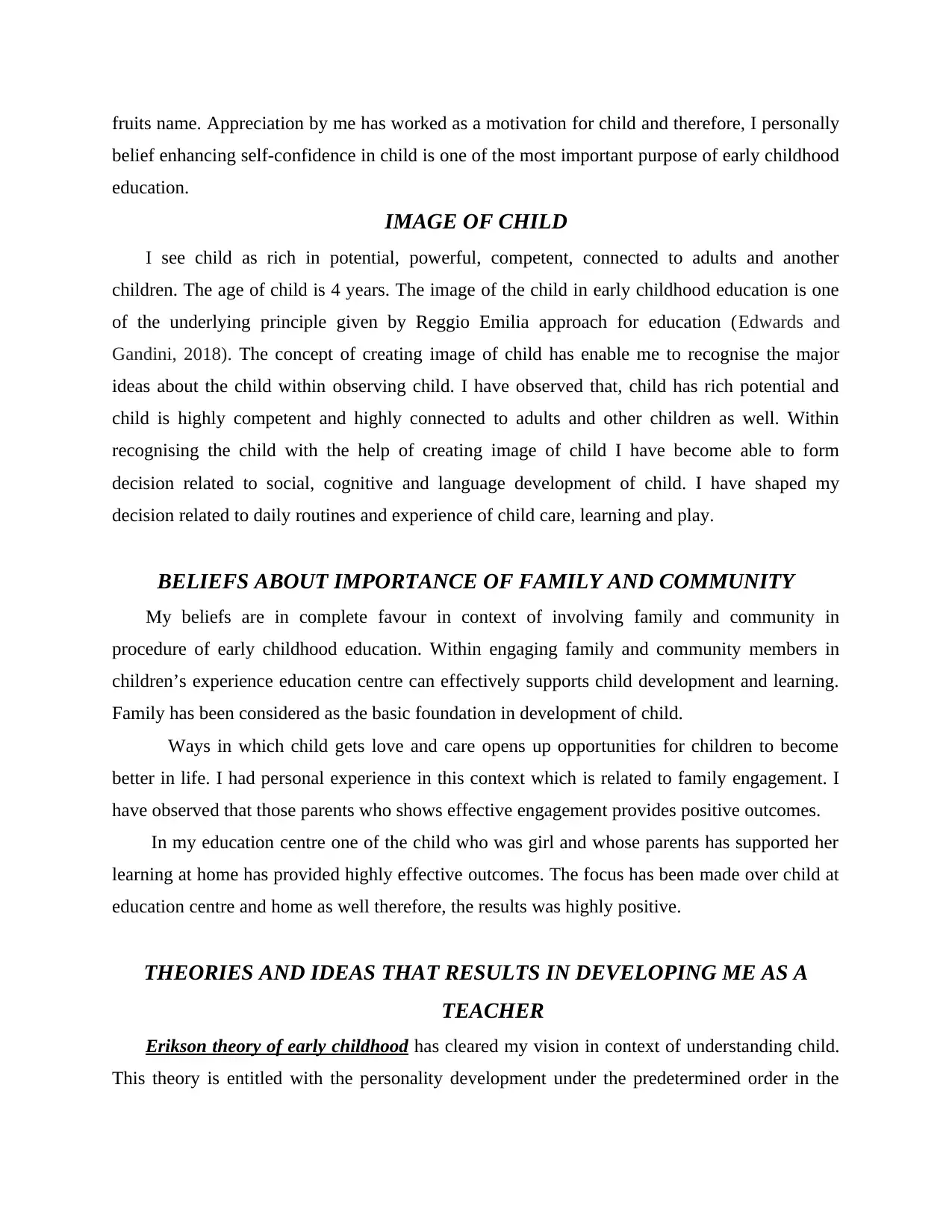
fruits name. Appreciation by me has worked as a motivation for child and therefore, I personally
belief enhancing self-confidence in child is one of the most important purpose of early childhood
education.
IMAGE OF CHILD
I see child as rich in potential, powerful, competent, connected to adults and another
children. The age of child is 4 years. The image of the child in early childhood education is one
of the underlying principle given by Reggio Emilia approach for education (Edwards and
Gandini, 2018). The concept of creating image of child has enable me to recognise the major
ideas about the child within observing child. I have observed that, child has rich potential and
child is highly competent and highly connected to adults and other children as well. Within
recognising the child with the help of creating image of child I have become able to form
decision related to social, cognitive and language development of child. I have shaped my
decision related to daily routines and experience of child care, learning and play.
BELIEFS ABOUT IMPORTANCE OF FAMILY AND COMMUNITY
My beliefs are in complete favour in context of involving family and community in
procedure of early childhood education. Within engaging family and community members in
children’s experience education centre can effectively supports child development and learning.
Family has been considered as the basic foundation in development of child.
Ways in which child gets love and care opens up opportunities for children to become
better in life. I had personal experience in this context which is related to family engagement. I
have observed that those parents who shows effective engagement provides positive outcomes.
In my education centre one of the child who was girl and whose parents has supported her
learning at home has provided highly effective outcomes. The focus has been made over child at
education centre and home as well therefore, the results was highly positive.
THEORIES AND IDEAS THAT RESULTS IN DEVELOPING ME AS A
TEACHER
Erikson theory of early childhood has cleared my vision in context of understanding child.
This theory is entitled with the personality development under the predetermined order in the
belief enhancing self-confidence in child is one of the most important purpose of early childhood
education.
IMAGE OF CHILD
I see child as rich in potential, powerful, competent, connected to adults and another
children. The age of child is 4 years. The image of the child in early childhood education is one
of the underlying principle given by Reggio Emilia approach for education (Edwards and
Gandini, 2018). The concept of creating image of child has enable me to recognise the major
ideas about the child within observing child. I have observed that, child has rich potential and
child is highly competent and highly connected to adults and other children as well. Within
recognising the child with the help of creating image of child I have become able to form
decision related to social, cognitive and language development of child. I have shaped my
decision related to daily routines and experience of child care, learning and play.
BELIEFS ABOUT IMPORTANCE OF FAMILY AND COMMUNITY
My beliefs are in complete favour in context of involving family and community in
procedure of early childhood education. Within engaging family and community members in
children’s experience education centre can effectively supports child development and learning.
Family has been considered as the basic foundation in development of child.
Ways in which child gets love and care opens up opportunities for children to become
better in life. I had personal experience in this context which is related to family engagement. I
have observed that those parents who shows effective engagement provides positive outcomes.
In my education centre one of the child who was girl and whose parents has supported her
learning at home has provided highly effective outcomes. The focus has been made over child at
education centre and home as well therefore, the results was highly positive.
THEORIES AND IDEAS THAT RESULTS IN DEVELOPING ME AS A
TEACHER
Erikson theory of early childhood has cleared my vision in context of understanding child.
This theory is entitled with the personality development under the predetermined order in the
⊘ This is a preview!⊘
Do you want full access?
Subscribe today to unlock all pages.

Trusted by 1+ million students worldwide
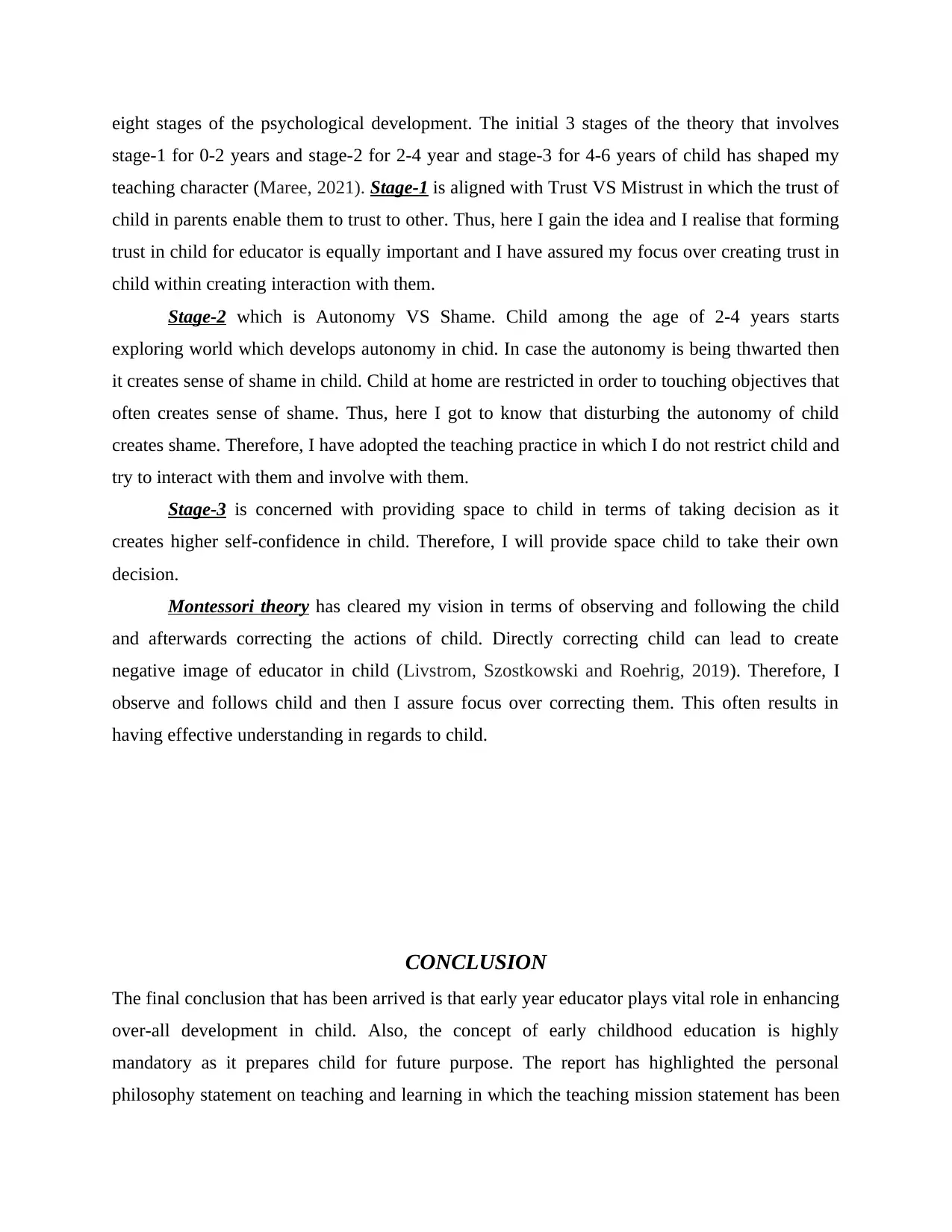
eight stages of the psychological development. The initial 3 stages of the theory that involves
stage-1 for 0-2 years and stage-2 for 2-4 year and stage-3 for 4-6 years of child has shaped my
teaching character (Maree, 2021). Stage-1 is aligned with Trust VS Mistrust in which the trust of
child in parents enable them to trust to other. Thus, here I gain the idea and I realise that forming
trust in child for educator is equally important and I have assured my focus over creating trust in
child within creating interaction with them.
Stage-2 which is Autonomy VS Shame. Child among the age of 2-4 years starts
exploring world which develops autonomy in chid. In case the autonomy is being thwarted then
it creates sense of shame in child. Child at home are restricted in order to touching objectives that
often creates sense of shame. Thus, here I got to know that disturbing the autonomy of child
creates shame. Therefore, I have adopted the teaching practice in which I do not restrict child and
try to interact with them and involve with them.
Stage-3 is concerned with providing space to child in terms of taking decision as it
creates higher self-confidence in child. Therefore, I will provide space child to take their own
decision.
Montessori theory has cleared my vision in terms of observing and following the child
and afterwards correcting the actions of child. Directly correcting child can lead to create
negative image of educator in child (Livstrom, Szostkowski and Roehrig, 2019). Therefore, I
observe and follows child and then I assure focus over correcting them. This often results in
having effective understanding in regards to child.
CONCLUSION
The final conclusion that has been arrived is that early year educator plays vital role in enhancing
over-all development in child. Also, the concept of early childhood education is highly
mandatory as it prepares child for future purpose. The report has highlighted the personal
philosophy statement on teaching and learning in which the teaching mission statement has been
stage-1 for 0-2 years and stage-2 for 2-4 year and stage-3 for 4-6 years of child has shaped my
teaching character (Maree, 2021). Stage-1 is aligned with Trust VS Mistrust in which the trust of
child in parents enable them to trust to other. Thus, here I gain the idea and I realise that forming
trust in child for educator is equally important and I have assured my focus over creating trust in
child within creating interaction with them.
Stage-2 which is Autonomy VS Shame. Child among the age of 2-4 years starts
exploring world which develops autonomy in chid. In case the autonomy is being thwarted then
it creates sense of shame in child. Child at home are restricted in order to touching objectives that
often creates sense of shame. Thus, here I got to know that disturbing the autonomy of child
creates shame. Therefore, I have adopted the teaching practice in which I do not restrict child and
try to interact with them and involve with them.
Stage-3 is concerned with providing space to child in terms of taking decision as it
creates higher self-confidence in child. Therefore, I will provide space child to take their own
decision.
Montessori theory has cleared my vision in terms of observing and following the child
and afterwards correcting the actions of child. Directly correcting child can lead to create
negative image of educator in child (Livstrom, Szostkowski and Roehrig, 2019). Therefore, I
observe and follows child and then I assure focus over correcting them. This often results in
having effective understanding in regards to child.
CONCLUSION
The final conclusion that has been arrived is that early year educator plays vital role in enhancing
over-all development in child. Also, the concept of early childhood education is highly
mandatory as it prepares child for future purpose. The report has highlighted the personal
philosophy statement on teaching and learning in which the teaching mission statement has been
Paraphrase This Document
Need a fresh take? Get an instant paraphrase of this document with our AI Paraphraser
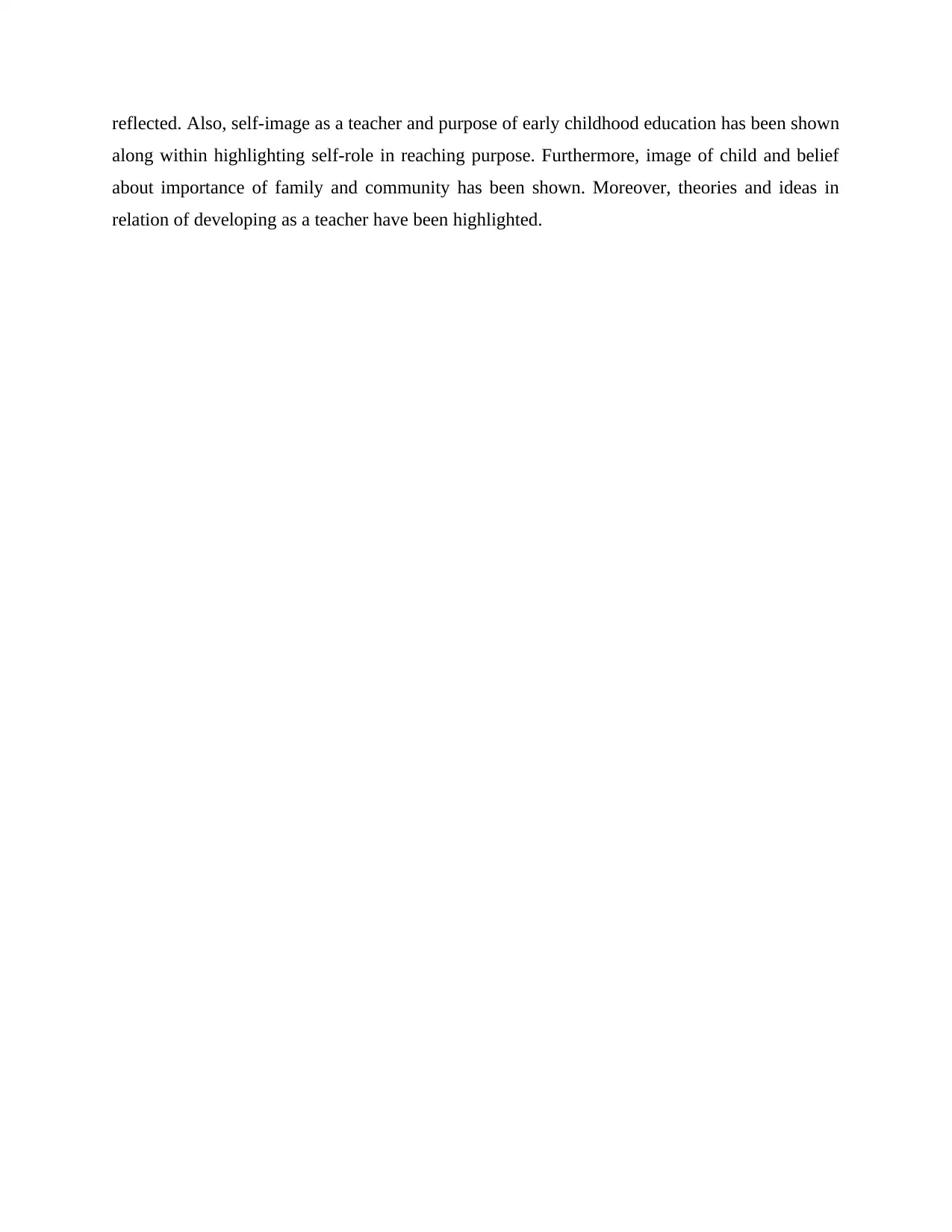
reflected. Also, self-image as a teacher and purpose of early childhood education has been shown
along within highlighting self-role in reaching purpose. Furthermore, image of child and belief
about importance of family and community has been shown. Moreover, theories and ideas in
relation of developing as a teacher have been highlighted.
along within highlighting self-role in reaching purpose. Furthermore, image of child and belief
about importance of family and community has been shown. Moreover, theories and ideas in
relation of developing as a teacher have been highlighted.
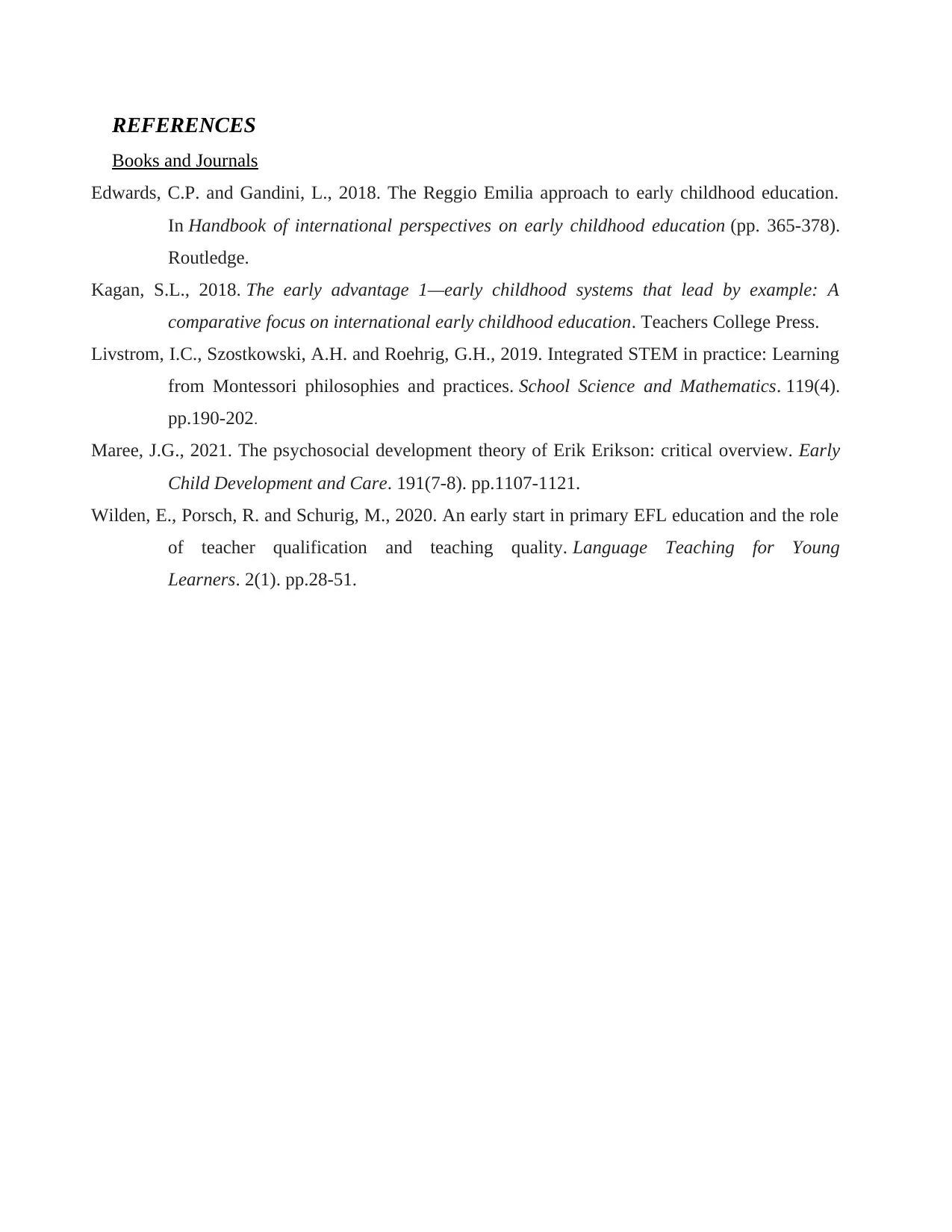
REFERENCES
Books and Journals
Edwards, C.P. and Gandini, L., 2018. The Reggio Emilia approach to early childhood education.
In Handbook of international perspectives on early childhood education (pp. 365-378).
Routledge.
Kagan, S.L., 2018. The early advantage 1—early childhood systems that lead by example: A
comparative focus on international early childhood education. Teachers College Press.
Livstrom, I.C., Szostkowski, A.H. and Roehrig, G.H., 2019. Integrated STEM in practice: Learning
from Montessori philosophies and practices. School Science and Mathematics. 119(4).
pp.190-202.
Maree, J.G., 2021. The psychosocial development theory of Erik Erikson: critical overview. Early
Child Development and Care. 191(7-8). pp.1107-1121.
Wilden, E., Porsch, R. and Schurig, M., 2020. An early start in primary EFL education and the role
of teacher qualification and teaching quality. Language Teaching for Young
Learners. 2(1). pp.28-51.
Books and Journals
Edwards, C.P. and Gandini, L., 2018. The Reggio Emilia approach to early childhood education.
In Handbook of international perspectives on early childhood education (pp. 365-378).
Routledge.
Kagan, S.L., 2018. The early advantage 1—early childhood systems that lead by example: A
comparative focus on international early childhood education. Teachers College Press.
Livstrom, I.C., Szostkowski, A.H. and Roehrig, G.H., 2019. Integrated STEM in practice: Learning
from Montessori philosophies and practices. School Science and Mathematics. 119(4).
pp.190-202.
Maree, J.G., 2021. The psychosocial development theory of Erik Erikson: critical overview. Early
Child Development and Care. 191(7-8). pp.1107-1121.
Wilden, E., Porsch, R. and Schurig, M., 2020. An early start in primary EFL education and the role
of teacher qualification and teaching quality. Language Teaching for Young
Learners. 2(1). pp.28-51.
⊘ This is a preview!⊘
Do you want full access?
Subscribe today to unlock all pages.

Trusted by 1+ million students worldwide
1 out of 9
Related Documents
Your All-in-One AI-Powered Toolkit for Academic Success.
+13062052269
info@desklib.com
Available 24*7 on WhatsApp / Email
![[object Object]](/_next/static/media/star-bottom.7253800d.svg)
Unlock your academic potential
Copyright © 2020–2026 A2Z Services. All Rights Reserved. Developed and managed by ZUCOL.





